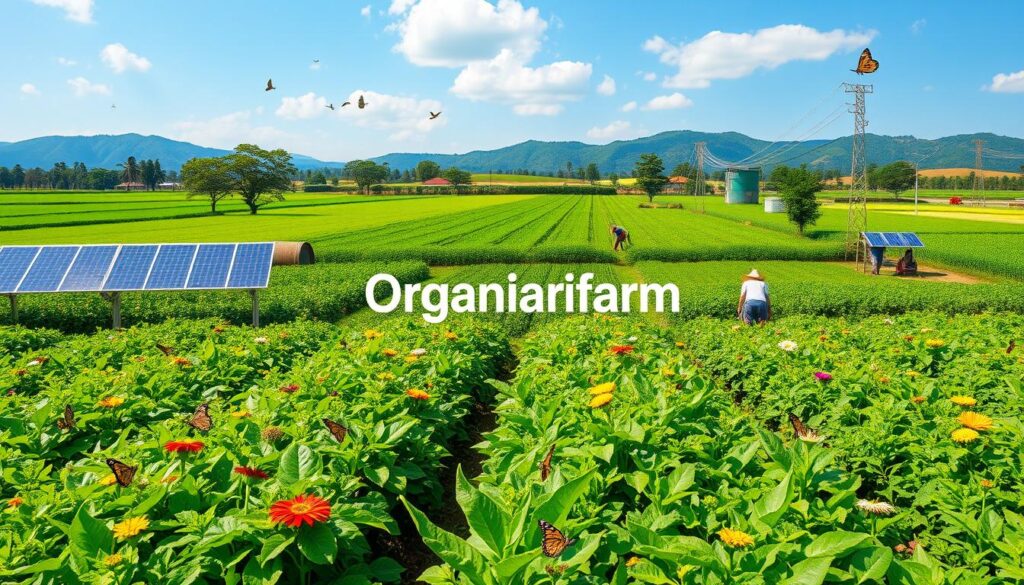India has over 1.59 million organic producers. This is a big change towards organic farming, thanks to more people wanting organic food and government support. Programs like PKVY and MOVCDNER help farmers grow food in a way that’s good for the planet.
The demand for organic food in India is growing fast. This makes organic farming a great area for growth. As more people look for organic options, it’s clear how important it is to farm in a way that’s good for the environment.
Key Takeaways
- India has 1.59 million organic producers operating in the country, making it a significant player in the global organic farming industry.
- The area under organic farming in India is increasing, with 2.7 million hectares of agricultural land dedicated to organic farming.
- Government initiatives such as PKVY and MOVCDNER are promoting organic farming in India, providing financial, training, and other supports to farmers.
- The market for organic produce in India is expected to increase exponentially due to rising concern for organic products.
- Organic farming in India is seen as a safer alternative to conventional farming because it does not utilize chemicals such as pesticides and fertilizers.
- Sustainable agriculture and eco-friendly farming practices are essential for the growth and development of the organic farming sector in India.
The Evolution of Organic Farming in India
Organic farming in India started in the early 20th century. It built on traditional methods like crop rotation and composting. But, the Green Revolution brought chemical farming, harming the environment and health.
Now, India is moving towards organic farming methods. Farmers use biological pest control and integrated pest management. Organic farming certification is key, with many bodies in the country. Techniques like green manure and vermicomposting are gaining popularity, improving soil health.
Organic farming in India has many benefits. It reduces soil erosion and uses less pesticides. The organic food market is growing fast, with a 25.25% CAGR from 2022-2027. Farmers are adopting organic farming methods to meet demand.
Some key features of organic farming in India include:
- Use of bio-fertilizers
- Nourishing soil through green manure and compost
- Increasing crop fertility and diversity
- Emphasis on crop rotation and composting
By using organic farming techniques and getting organic farming certification, farmers in India can improve their lives. They also help make farming more sustainable and environmentally friendly.
Understanding the Principles of Organic Agriculture
Organic farming focuses on sustainability, biodiversity, and ecosystem services. It aims to improve soil health, save water, and cut down on chemical use. Organic farming also helps reduce pollution and boosts biodiversity.
By 2021, over 187 countries were practicing organic farming. They had a total of 72.3 million hectares of land dedicated to organic farming. The top countries for organic farming were Australia, Argentina, and Spain, among others.
Organic farming practices include crop rotation, composting, and natural pest control. These methods keep soil fertile, reduce erosion, and support biodiversity. The organic farming benefits are many, like better crop yields and higher farmer incomes.

The Indian government supports organic farming with schemes like Paramparagat Krishi Vikas Yojana. Some states have their own organic farming policies. Organic farming is key to a sustainable and green agriculture system.
Some key organic farming benefits are:
- Improved soil health
- Increased biodiversity
- Reduced environmental pollution
- Improved crop yields
- Increased farmer incomes
Current State of Organic Farming in India
India has made big strides in organic farming. It now has 2,657,889 hectares of land dedicated to it, ranking sixth worldwide. The country also has the most organic producers, with 1,590,10 farmers. The government has launched many initiatives to support sustainable farming and cut down on chemical use.
The states of Maharashtra, Gujarat, and Karnataka are leading in organic farming. These areas produce a lot of organic food. The government’s efforts, like the National Mission for Sustainable Agriculture, have helped grow organic farming here. This has led to more people wanting organic food, thanks to its health and environmental benefits.
The demand for organic food is rising fast. The organic food market in India covers 2.6 million hectares, ranking fifth globally. Organic farming now makes up 1.5% of India’s total agricultural land, with over 78 million hectares dedicated to it. The government’s programs, like the Paramparagat Krishi Vikas Yojana (PKVY) and the Mission Organic Value Chain Development for North Eastern Regions (MOVCD), have helped organic farming grow.
| State | Area under Organic Farming (hectares) |
|---|---|
| Madhya Pradesh | 0.76 million |
| Maharashtra | 0.35 million |
| Rajasthan | 0.28 million |
The process of getting organic farming certified in India is becoming more important. Several state agencies are now accredited by APEDA. The market for organic products in India is expected to keep growing. The US Department of Agriculture predicts it will reach $10.1 billion by 2026.
Environmental Impact and Sustainability Benefits
Organic farming is great for the environment. It makes soil healthier, cuts down on water pollution, and boosts biodiversity. By using eco-friendly farming methods, farmers can avoid harmful chemicals. This supports sustainable agriculture.
The advantages of organic farming are many. For example:
- Soil health improves with natural fertilizers and less soil disturbance.
- Water pollution decreases with better water use and no chemical runoff.
- Biodiversity grows by saving natural habitats and supporting ecosystem services.
Studies show organic farming reduces soil erosion and boosts soil fertility. It also cuts down nitrogen loss. Organic farming increases plant and animal diversity by about 30% in farms.

In India, organic farming makes soil richer in organic matter and nitrogen. This helps agriculture be more sustainable. By choosing sustainable agriculture, farmers help fight climate change. They also improve their lives and ensure food for everyone.
Challenges and Solutions in Indian Organic Agriculture
Indian organic farming has many hurdles, like getting organic farming certification and high costs. Small farmers face a big challenge with the high cost of organic farming certification. Also, organic farming methods need more labor and resources, making production expensive.
Some of the key challenges and solutions in Indian organic agriculture include:
- Certification hurdles: The government can provide subsidies or incentives to help small-scale farmers obtain organic farming certification.
- Production costs: Farmers can adopt efficient organic farming methods to reduce costs and increase productivity.
- Market access issues: The government can establish organic markets and provide support for farmers to connect with consumers directly.
Despite these challenges, Indian organic agriculture has a bright future. With more demand for organic produce, farmers can profit from organic farming methods and organic farming certification. The government and other stakeholders can support organic farming’s growth in India.
| State | Land Coverage under Organic Cultivation | Organic Production |
|---|---|---|
| Madhya Pradesh | 11.61 lakh hectares | 9.8 lakh metric tonnes |
Economic Viability and Market Opportunities
Organic farming in India is both economically viable and full of market chances. The country has a big chance to export organic goods to other nations. At the same time, the demand for organic food in cities is growing.
The organic farming benefits are many. Farmers can make more money, and people want to buy organic food. Studies show that farmers are switching to organic farming because of pollution, food safety, and the harm of chemical farming.
Some key reasons why organic farming is good for India’s economy include:
- Lower costs of cultivation
- Higher benefit-to-cost ratio
- Increasing international demand for organic produce
The market for organic produce in India is huge. There’s a big demand for organic products in both the country and abroad. As more people learn about the benefits of organic produce, the demand will keep growing. This offers a great chance for organic farmers in India.
Conclusion: The Future of Organic Farming in India
The future of organic farming in India looks bright. The country is becoming a leader in sustainable agriculture. The demand for organic produce is rising, thanks to government support like the Paramparagat Krishi Vikas Yojana (PKVY) and the National Programme for Organic Production (NPOP).
India’s varied climate and growing health awareness boost organic demand. Products like tea, spices, rice, and cotton are in high demand globally. India is a top exporter of organic goods.
But, there are challenges ahead. Issues like certification, costs, and market access need to be solved. Supporting sustainable farming, helping small farmers, and improving market access can make a big difference.
With the right policies and ongoing support, organic farming can greatly benefit India’s agriculture. It will help the environment and improve farmers’ lives nationwide.
